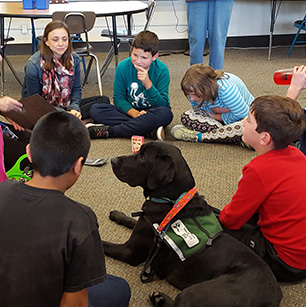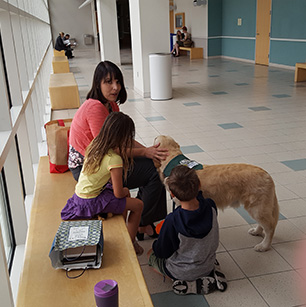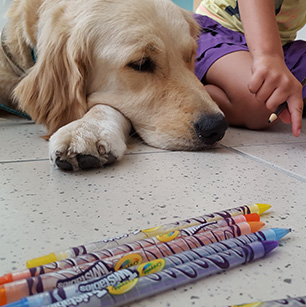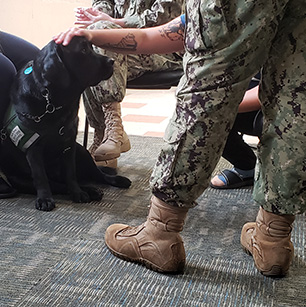What Is A
Facility Dog?
September 2024 IMPORTANT NOTE:
At the current time Pawsitive does not have any PT-owned and trained facility dogs available.
However, you can still fill out the pre-application and join the wait list. See the “HOW TO OBTAIN A FACILITY DOG” section below.
We do have spots available in our Facility Dog Academy that you and your personal dog could attend. See the “HOW TO OBTAIN A FACILITY DOG” section below.
A Facility Dog, trained in obedience and specialty cues, is used in the work setting under the direction of the professional partner who has been trained in specific techniques which enable the dog to serve as a tool and a motivator, thus enhancing the accomplishment of client-related goals. The dog must be receptive to accepting leadership and direction from the trained handler, have the ability to maintain a calm and polite manner in all situations, and be adaptable to interact with a variety of people in different situations when given a command by the handler.
Here’s a great article by Antonia Malchik titled “What if Schools Hired Dogs as Therapists?” This article explains how Facility Dogs help children hindered by rough backgrounds overcome learning issues in certain school subjects.
PAWSITIVE TEAMS TRAINS AND PLACES FACILITY DOGS WITH PROFESSIONALS WHO LIVE IN SAN DIEGO COUNTY.
- The facility dog should demonstrate basic obedience skills by responding to voice and/or hand signals for sitting, staying in place, lying down, walking in a controlled position near the facilitator and coming to the facilitator when called.
- The facility dog must be partnered with a working professional facilitator and skilled at maintaining a calm manner and good social behavior in a variety of environments. They must also be accustomed to interacting with different types of people. including those with physical and/or developmental disabilities.
- The work setting must include a suitable place for the dog to have “time out” when not being used actively with the client. This could be a crate or dog bed set up in an office. The dog should not be allowed to roam around off-lead or unsupervised at any time and should not be expected to “work” actively for extended periods of time.
- The handler’s supervisor must represent the facility in formally authorizing the presence of the facility dog in the selected setting.
- The certified Facility Dog team has access rights only when working directly with the client in the authorized work setting. The handler will be provided with a laminated ID card with photo and names of the dog and partner. The dog must wear a logo cape, harness, or backpack while in the work setting.
- that the dog can remain calm and display good social behavior while interacting with a variety of people in different environments.
- knowledge of acceptable training techniques.
- an understanding of canine care and health.
- the ability to maintain training, problem solve, and continue to train and add new skills as needed.
- an understanding of how to use the dog in canine assisted interventions.
- knowledge of local access laws and appropriate public behavior.
- Must behave in a very predictable, reliable, and controllable manner.
- Is very accepting and forgiving of differences in people’s reactions and behaviors.
- Demonstrates relaxed body posture.
- Is able to hold an extended down-stay in a quiet and unobtrusive manner.
- Relates to and gravitates towards a variety of people, including children.
- Likes being petted and touched.
- Remains calm in a variety of distracting situations.
- Responds reliably to basic commands when spoken in a soft voice or through subtle hand signals.
- Is willing to work with a secondary handler while in the presence of the primary handler.
- Demonstrates appropriate social skills (eye contact, smiles, confident posture, conversation) needed for interacting with people.
- Acts as the dog’s advocate in all situations.
- Must agree to a complete and thorough background check, including but not limited to, criminal history.
- Must be able to maintain a professional composure at all times.
- Communicates consistently with the dog using non-forceful (verbal or non verbal) means of communication.
- Is experienced in reading the dog’s cues and signs of stress and acts accordingly.
- Protects and respects the dog’s needs while at the same time interacting appropriately with clients.
- Special Education Classrooms: A highly trained Facility Dog, with a certified handler, will work in an environment where the physical, social, educational or mental health of students can be improved through goal directed interactions.
- Physical and Occupational Therapy: By interacting with a Facility Dog, client participation increases as the client engages in a pleasant canine activity that often turns tough physical activities into positive interactions and more successful repetitions.
- Clinical/Social Work Counseling: The presence of a Facility Dog can reduce the amount of time that a client might need to trust the therapist with deep secrets. This often lessens depression, improves reality orientation and decreases manipulative behaviors.
- Speech and Language Therapy: A Facility Dog can help a client initiate speech and improve descriptive skills.
- Adapted Physical/Recreational Therapy: Physical activities are easier for clients when a Facility Dog is used as a motivator and as a tool.
- Functional outcome goals: A Facility Dog can be utilized to promote range of motion, strengthening, balance, coordination, visual and cognitive goals.
- Client motivation: Client and Facility Dog together can engage in physical activities which help achieve goals set by the therapist. The dog offers the client unconditional love and is nonjudgmental in interactions. This leads to a treatment session that is pleasurable as well as productive.
- Social interactions and language: Simple petting can encourage talking. A Facility Dog can promote social interaction and language and often enhance the ability of a child to share secrets too difficult to tell an adult.
- Anxiety/Stress reducer: A Facility Dog can be used to help calm a child experiencing a high level of anxiety/stress. Just sitting quietly with the dog gives a child time to reflect and develop better coping skills.
- Positive reward system for good behavior: A Facility Dog can be a powerful motivator for students to reach specific goals. Rewards can include special time with the dog, interactive play or simply quiet time.
OPTION 1: Obtain a Pawsitive Teams-trained facility dog
September 2024 IMPORTANT NOTE:
At the current time Pawsitive does not have any PT-owned and trained facility dogs available. However, you can still fill out the pre-application and join the wait list. .
Occasionally, Pawsitive Teams feels that a puppy we have been preparing for service dog work isn’t suitable to be placed with someone with limited mobility yet would do well in a work environment under the guidance of an able-bodied professional. In addition, we may take in a young dog around a year old that has excellent potential for Facility Dog work. Depending on age, our Facility Dogs receive one to two years of intensive training with one of our service dog trainers and are skilled at maintaining a calm manner in all situations. The dog is adaptable and used to interacting with a variety of people, including those with physical and/or developmental disabilities. The Facility Dog will live in the home of the professional after certification and go to work with that person. Prior to certification, Pawsitive Teams works closely with the professional for approximately two months, conducting customized dog handling sessions, including numerous sessions at the facility itself. If you feel you might be a good match for a Pawsitive Teams-owned and trained facility dog, send us your Pre-Application here.
OPTION 2: Become certified with your own dog!
Pawsitive Teams now offers a six-month Facility Dog Academy twice a year for owners who believe their well-trained dog can be used effectively to accomplish their clients’ work-related goals. The Academy includes:
- In-person classes (hands on and lectures)
- Meetings with your coworkers and supervisors at your workplace
- Practice sessions using the cues for your dog that you identify as important to the success of your clients
- Ongoing workplace observations by Pawsitive Teams staff and our Facility Dog volunteers.
- A final test for you to demonstrate that you and your dog have the skills needed to become certified.
There are two prerequisites to enroll in the Academy:
- You and your dog must successfully pass the AKC’s Canine Good Citizen Test (CGC or above).
- You and your dog must complete our Pawsitive Teams Therapy Dog Prep School.
If you feel you and your dog would make a good team for this Academy, complete the Pre-Application for the Pawsitive Teams Facility Dog Academy here. Our Facility Dog Program Manager will contact you right away to discuss the next steps.




